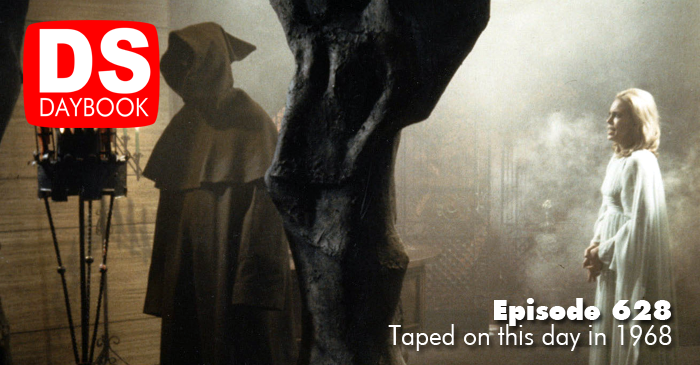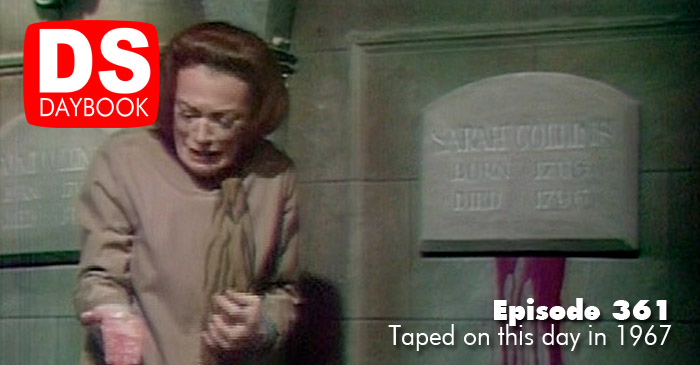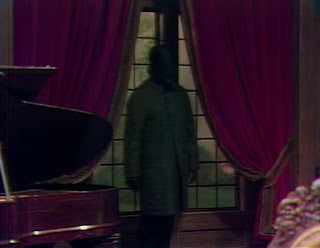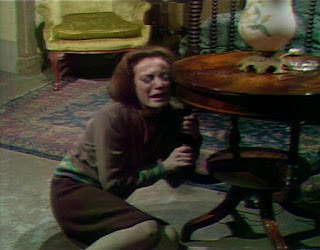
By PATRICK McCRAY
Taped on this date in 1967: Episode 365
When Sarah begins appearing in David’s bedroom, Vicki travels back to 1795 to straighten her hash out. Vicki: Alexandra Moltke. (Repeat; 30 min.)
To address Sarah’s ubiquity, Barnabas reluctantly agrees to participate in a seance. Of course, a blackout results in Vicki changing places with the original governess, Phyllis Wick… from 1795. This is precisely where Vicki finds herself.
We are one episode away from 1795, which is when the future began.
Dark Shadows is taking a television show on vacation for the first time since Lucy. If Desi had jumped off the balcony of the Tropicana Club, Ethel had tried Harpo Marx for witchcraft, and Fred Mertz had posed around the set in Nathan Forbes’ first trousers (don’t claim you don’t know what I’m talking about), would I Love Lucy and the 1795 storyline be synonymous? My work is done.
It’s also a move more daring than the introduction of Barnabas, himself. We are sampling the core of Dark Shadows; everything else is watching Dan Curtis forge new alloys with the metal found in this mine. If this is the show’s first ultimate trip, 365 is like watching the main characters pack. Of course, none but one are going, and they are all going, in a certain sense. Curtis and his company are not just giving us a last glimpse before the trip, but he’s also getting ready for next spring and their return.
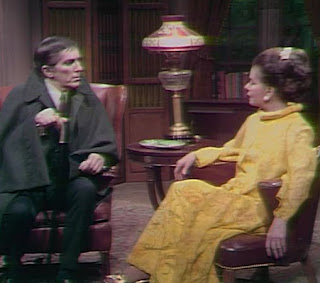 The return from 1795 is a reboot for the show. Yes, it’s Dark Shadows, but it knows it’s Dark Shadows. It knows its bread and butter is Barnabas, and he’s evolved into a hero. Of course, villains make the best heroes because they have more choices in front of them, and thus, a greater capacity for action. At this point, the producers make a point of having him soft-pedal the evil in favor of seeing him reflect in 365 that this life is not one that he chose. Gee, Barnabas, what do you mean? And cue time travel. It almost makes me wonder if Sarah’s recent appearance were a cosmic preparation for the journey back. Not to prepare the characters so much as the audience. And why not a seance as the time machine? Dark Shadows never exactly ran on practicality. Here, more than anywhere, it runs on metaphor.
The return from 1795 is a reboot for the show. Yes, it’s Dark Shadows, but it knows it’s Dark Shadows. It knows its bread and butter is Barnabas, and he’s evolved into a hero. Of course, villains make the best heroes because they have more choices in front of them, and thus, a greater capacity for action. At this point, the producers make a point of having him soft-pedal the evil in favor of seeing him reflect in 365 that this life is not one that he chose. Gee, Barnabas, what do you mean? And cue time travel. It almost makes me wonder if Sarah’s recent appearance were a cosmic preparation for the journey back. Not to prepare the characters so much as the audience. And why not a seance as the time machine? Dark Shadows never exactly ran on practicality. Here, more than anywhere, it runs on metaphor.Here, we see a mix of who the characters have been and who they’ll become upon Vicki’s return. Roger is fussy and particular, and yet he has a winning enthusiasm for the whimsy of a séance. Carolyn is merging debutante sophistication with a more sober kind of confidence that she gains after being chosen by Barnabas. She will need that increasing sense of backbone to deal with Adam. Barnabas and Julia are still at each other‘s throats, but the impression of stalemate has never been stronger. Fate has them both by the shorthairs, and they will eventually need each other there to survive. They are not friends. It will take threats like Angelique to forge that relationship, but the potential is finally there.
Sarah is again the catalyst for this major action. It’s appropriate that they exorcise her with this. Indeed, after 1795, I don’t recall her even being mentioned. It’s as if the pipe to the afterlife is clogged up, and all it takes is a seance-driven time trip to unplug it and let the kid through. Sarah is the quintessential Little Girl Lost, and that figure is the driving metaphor of the show until Willie opens the coffin. Liz, lost to guilt. Maggie, lost to an alcoholic father on the wrong side of the lobster boat dock. Carolyn, lost to being one of the only ones on the RIGHT side of the lobster boat dock. And Vicki, completing the Lilith Fair lineup that inaugurated the show, so lost she just doesn’t understand. It’s a central theme to the show and the ultimate ambassador to lonely women at home -- their prime demographic. Ultimately, it was a demographic that wanted a view (of Jonathan Frid) rather than a mirror. Why not burn it out completely by taking Vicki away in time as well as space?
The Collins family rarely met a problem that couldn’t be addressed via seance, and 365 runs with the notion so far and fast that it drops Vicki off in 1795… maybe just because. Perhaps she just wants a friend, and this is ultimately easier than constantly appearing as a ghost. We never see her again because she only has one charge left in the battery… just enough to get Vicki back to 1968. How does she know to do this? It could be that her first act as a ghost was to send Vicki back home after the 1795 trip. Sarah’s engineered time travel before… just kind of backwards.
Few, if any, shows discover themselves as this radically different than they were in their inception. But is it? For Dark Shadows, variety is the point. Where does Vicki go? Dark Shadows? From where has she come?
Exactly.
This episode was broadcast Nov. 17, 1967.

